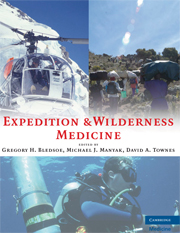Book contents
- Frontmatter
- Contents
- Contributors
- Foreword
- Preface
- Acknowledgments
- PART I EXPEDITION PLANNING
- 1 The Expedition Physician
- 2 Assessing Expedition Medical Needs
- 3 Expedition Medical Kit
- 4 Immunizations
- 5 Legal Considerations during Expedition Planning
- 6 Travel Safety
- 7 Nutritional Support for Expeditions
- 8 Water Treatment
- 9 Special Considerations
- 10 Communications Planning for the Expedition Medical Officer
- 11 Minimizing Risk on an Expedition
- 12 The Expedition Returns
- PART II EXPEDITIONS IN UNIQUE ENVIRONMENTS
- PART III ILLNESS AND INJURIES ON EXPEDITIONS
- APPENDIX The Expedition Medical Kit
- Index
9 - Special Considerations
Elders, Women, Pregnant Women, Children, and the Immunocompromised
from PART I - EXPEDITION PLANNING
Published online by Cambridge University Press: 05 March 2013
- Frontmatter
- Contents
- Contributors
- Foreword
- Preface
- Acknowledgments
- PART I EXPEDITION PLANNING
- 1 The Expedition Physician
- 2 Assessing Expedition Medical Needs
- 3 Expedition Medical Kit
- 4 Immunizations
- 5 Legal Considerations during Expedition Planning
- 6 Travel Safety
- 7 Nutritional Support for Expeditions
- 8 Water Treatment
- 9 Special Considerations
- 10 Communications Planning for the Expedition Medical Officer
- 11 Minimizing Risk on an Expedition
- 12 The Expedition Returns
- PART II EXPEDITIONS IN UNIQUE ENVIRONMENTS
- PART III ILLNESS AND INJURIES ON EXPEDITIONS
- APPENDIX The Expedition Medical Kit
- Index
Summary
The spirit of adventure is alluring. For some the attraction comes from an irresistible personal need to explore; for others the song of the mountains, deserts, rivers, seas, ice caps, and even skies beckons. The gentle touch of a breeze on the cheek, the crunch of scree underfoot, and the scent of trees and flowers tickle the senses and, once experienced, leave a memory that calls for revisiting in the future.
Many who have experienced such wilderness activities share their reactions with others who may respond to the call and join them. The exploring community is no longer made up predominantly of scientists but of individuals of varying physical abilities, skills, experiences, and health. Some may require special consideration if they are to participate in the activity. This chapter will deal with special considerations for populations with possibilities for limited physical and environmental tolerance: elders, women, pregnant women, children, and the immunocompromised. These individuals add to the rapidly growing number of participants in a wide assortment of adventures led by organized groups.
Many ventures are quite demanding in a physical, mental, emotional, and environmental sense. Some may even be unsafe and hazardous. As a result, the degree of attention placed on planning, organizing, and undertaking the venture may warrant the term “expedition” to define the activity. Defined as “a journey, voyage, excursion or venture undertaken for a specific purpose,” an expedition may vary considerably in its characteristics, demands, and hazards.
- Type
- Chapter
- Information
- Expedition and Wilderness Medicine , pp. 123 - 133Publisher: Cambridge University PressPrint publication year: 2008



